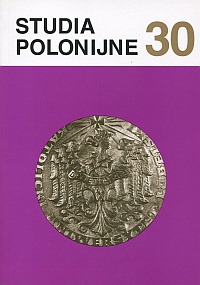O. Józef Grochot – duszpasterz Polonii we Francji
Main Article Content
Abstrakt
Józef Grochot was born on 9 July 1915. He left secondary school which belonged to asmall seminary in Toruń in 1933. He concluded a year's novitiate at the Redemptorists Order and took vows on 2 August 1934. After five years of philosophical-theological studies on 25 June 1939 he was ordained priest. When the Second World War broke out, in a group of six, running away from the German army and then from the Soviet army, on 17 September he crossed the Romanian border and at the beginning of October he arrived at the Redemptorists’ General Home in Rome. Immediately he was sent to the Redemptorists Seminary in Cortona in order to complete his theological studies. From 1941 he gave lectures in this seminary on patrology and history of the Church, and he was appointed an assistant tutor. From September 1942, together with a group of clerics he stayed in Marzocca, north of Ancona. There, on 20 July 1944 he met Polish troops that earlier had captured Ancona. On 1 September he became an armed-forces chaplain. At the end of December 1944 he was called to Egypt, where on 18 February he was appointed chaplain of the 10th Hussar Regiment, with which through Italy he went to England. After the Polish Armed Forces in the West were dissolved, from November 1947 to June 1950 he studied philosophy at the Angelicum in Rome. In the years 1950-1951 he lectured on ethics in the Redemptorists Seminary in Dreux, and from 1951 to 1953 he studied social sciences at the Catholic University of Lille. He established contact with the Polish Catholic Mission in France in May 1951. From then on, working at the Redemptorists Seminary in Echternach, and from 1969 at the Redemptorists Vice-province in Denmark, until 1985 he permanently co-operated with the Polish Catholic Mission in France. He presided over retreats for the priests working for the Mission, for Polish nuns in France, for guard companies in France; he preached at some of the more important celebrations at the Mission, and actively participated, as „theological adviser” to the Rector of the Mission, in academic-pastorate conventions of Polish priests organized by the Rectorate alone as well as in co-operation with the French Episcopate Committee for Immigrants. He was a lecturer at the so-called Catholic Culture Evenings organized from 1983 in the „Polish” church in Paris. He died in Copenhagen on 14 December 1993.

